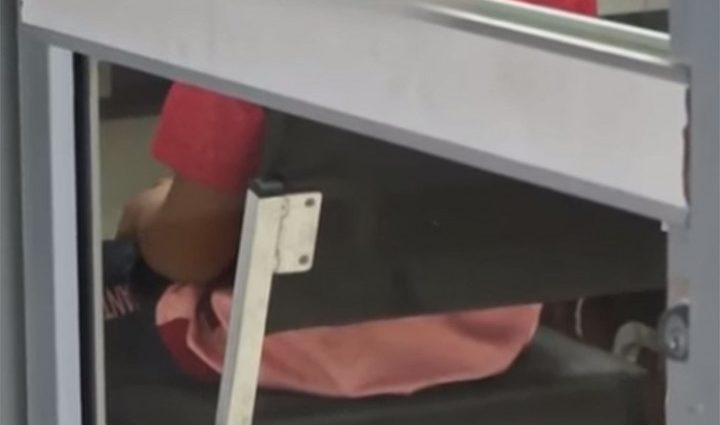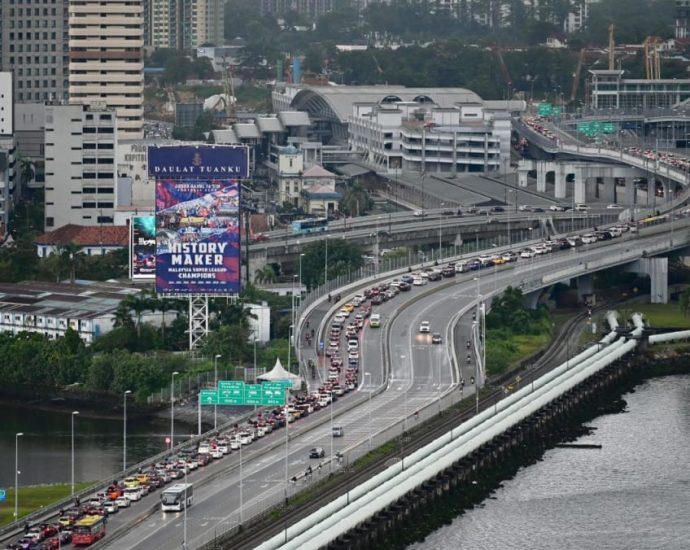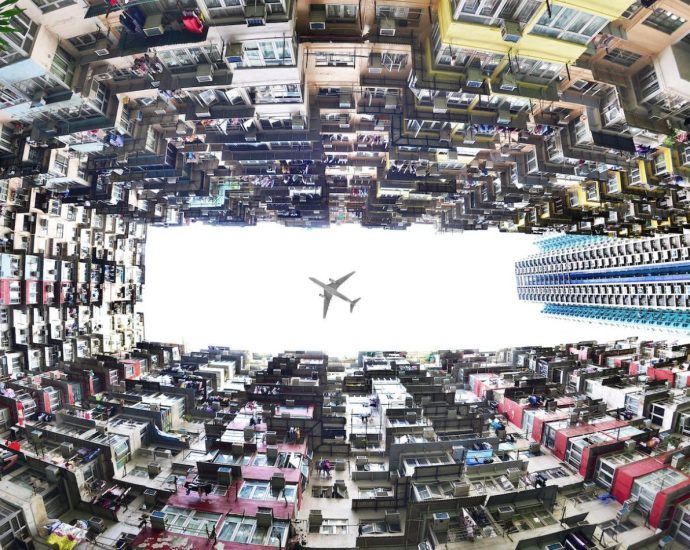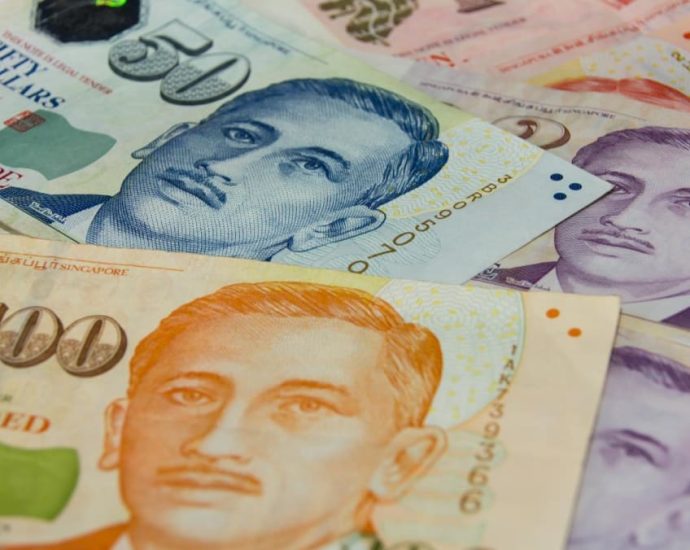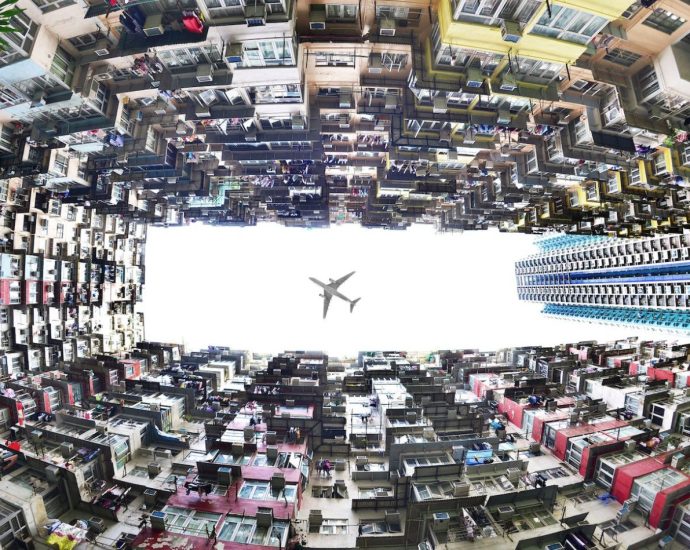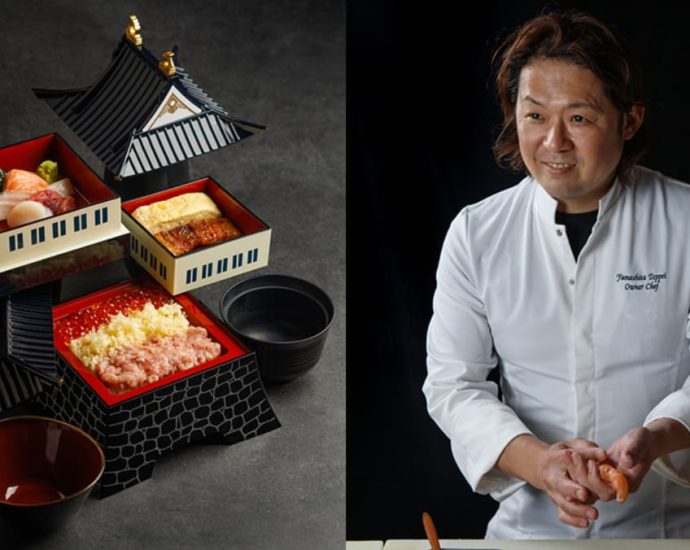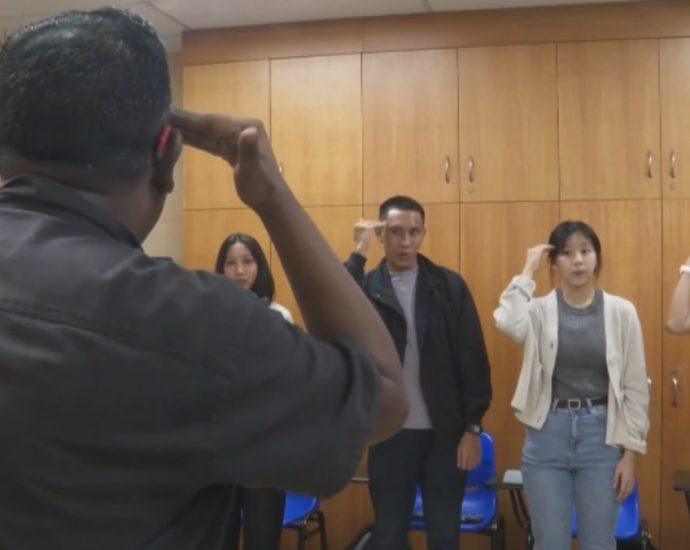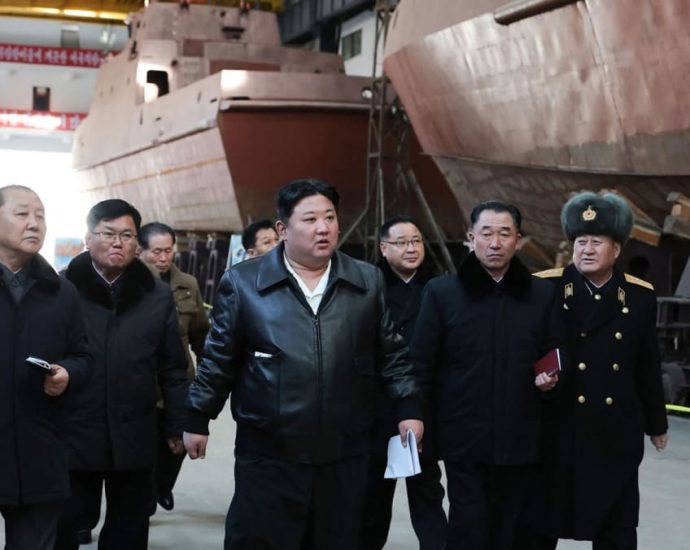Schoolboy detained for stabbing two students in Trang
PUBLISHED : 2 Feb 2024 at 12:36

A 14-year-old schoolboy was held for stabbing two fellow students during a brawl near their school in Yan Ta Khao district of Trang on Thursday evening. The victims sustained serious knife wounds.
The incident occurred on Trang-Palian Road in tambon Yan Ta Khao, about 100 metres away from a well-known secondary school, said Pol Capt Suwit Suwanrat, deputy investigation chief at Yan Ta Khao police station, who was reported about 4.30pm on Thursday.
Upon reaching the scene, police found a pool of blood, and the two injured students had already been taken to Yan Ta Khao Hospital.
Both students, aged 14 and in Mathayom Suksa 2 (Grade 8), suffered critical injuries. The first victim was stabbed in the right breast, penetrating the lung, while the second victim was stabbed in the left breast near the heart. Due to their conditions, doctors transferred them to Trang Hospital.
According to police investigation, the victims and four fellow students walked from the school on Thursday evening and encountered a group of five students, also Grade 8 from the same school. The two groups had a confrontation near the entrance of a restaurant, approximately 100 meters away from the school’s gate.
As talks failed, a brawl ensued. One student from the rival group pulled out a sharp-pointed knife, stabbing the first victim until he fell to the ground. The second victim rushed to help but was also stabbed by the same attacker. After the attack, the assailant and his friends fled on motorcycles.
Police managed to arrest the attacker, a 14-year-old Grade 8 student, at a house in tambon Thung Krabue in the same district. A blood-stained knife was seized after it was dumped to a ditch at an oil palm plantation.
Pol Col Poonsak Saengsae, chief of Yan Ta Khao police station, said the attacker admitted to stabbing the two students after they failed to patch up their personal dispute, leading to a brawl.
The attacker was detained for questioning. A psychologist, a prosecutor and concerned officials also joined the investigation.
The knife attack took place just a few days after violence involving schoolboys in Bangkok. The attacker faced a murder charge of murder after a fellow student was stabbed in the neck and abdomen with a fruit knife during morning assembly in Bangkok on Monday.
Nawaz Sharif: Ousted Pakistan PM returns from exile to become election front-runner
 EPA
EPAPakistan’s former three-time prime minister Nawaz Sharif only returned from exile last year but is now the clear front-runner to win the 8 February election.
Few could have predicted his return to the top, despite his dominance in Pakistani politics these past three decades.
His last term ended in him being convicted of corruption, and the time before that, he was toppled in a military coup.
Still, he appears on the brink of making another successful comeback, a dramatic turnaround for someone who had long been viewed as an opponent to Pakistan’s powerful military.
“He’s a top candidate to be the next premier not because he’s wildly popular – he certainly is – but more so because he’s played his cards right,” says analyst Michael Kugelman, the South Asia Director at the Wilson Center think tank.
Mr Sharif’s arch-rival and former Prime Minister Imran Khan – previously backed by the military – is now the one locked up in jail, his popular party restricted across the country.
What’s his story?
One might say that Mr Sharif is the king of comebacks. He’s certainly done it before.
Ousted from his second term in a 1999 military coup, he returned in the 2013 parliamentary elections, staging a triumphant comeback to become Prime Minister for a record third term.
That was a historic moment for the country, as it was the first transition from one democratically elected government to another since independence in 1947.

But Sharif’s last period in office was marred by upheavals – starting with a six-month opposition blockade of the capital Islamabad, and ending with court proceedings over corruption allegations which eventually led to the Supreme Court disqualifying him in July 2017. He resigned shortly afterwards.
In July 2018 he was found guilty of corruption by a court in Pakistan and sentenced to 10 years in prison. Two months later, Islamabad’s high court suspended the sentences and ordered his release, pending the conclusion of the appeals process.
He then fled to the UK, where he’d been living in exile the past four years until his return last October.
Even in absentia though, he has been one of the country’s leading politicians for the past 35 years.
Early years
Nawaz Sharif was born into the family of a prominent Lahore industrialist in 1949 and made his mark in politics representing an urban constituency.
He first came to national prominence during the early days of Gen Zia’s martial law, serving as Punjab province’s finance and then chief minister from 1985-1990.
Observers recall him as not being a particularly impressive political figure, but said he nonetheless proved himself an adept administrator. He became prime minister in 1990, but was dismissed in 1993, clearing the way for the then opposition leader, Benazir Bhutto, to form a government.
Owner of Ittefaq Group, a leading steel mill conglomerate, he is among the country’s wealthiest industrialists.
A protégé of military leader Gen Zia ul-Haq – who ruled Pakistan from 1977 to 1988 – Mr Sharif is perhaps best known outside Pakistan for ordering the country’s first nuclear tests in 1998.
Military coup
After becoming prime minister again in 1997 with a comfortable majority, Mr Sharif appeared to dominate the political landscape and exerted a powerful hold over all the country’s major institutions – apart from the army.
Then, frustrated by opposition in parliament, he tried to pass a constitutional amendment that would have enabled him to enforce Sharia law. He also confronted other power centres – a mob of his supporters ransacked the Supreme Court and he tried to rein in Pakistan’s powerful military.
But Mr Sharif’s overthrowing in 1999 by then army chief Pervez Musharraf showed how dangerous it was for any politician to attempt to curtail the military’s influence in Pakistan.
Mr Sharif was arrested, jailed and eventually sentenced to life imprisonment on charges of hijacking and terrorism. He was also convicted of corruption and banned for life from political activities.
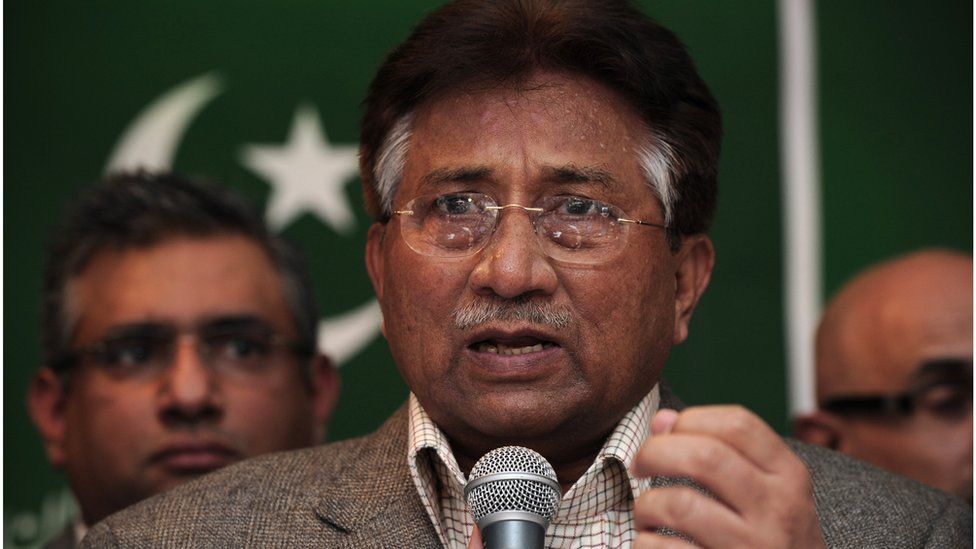
But an alleged deal, brokered by the Saudis, saved him and other family members from being put behind bars. Mr Sharif and 40 members of his family were exiled to Saudi Arabia for what was supposed to be a period of 10 years.
Owen Bennett-Jones, BBC Islamabad correspondent at the time, recalls that when Mr Sharif was removed from power, many Pakistanis expressed great relief, describing him as corrupt, incompetent and power-hungry.
Corruption allegations
Mr Sharif’s first time in the political wilderness lasted until his triumphal return to Pakistan in 2007 following a deal with the military.
Back in Pakistan, he patiently bided his time in opposition. His party won about a quarter of parliamentary seats in the 2008 elections.
Though tipped to win the 2013 elections he surprised many with the scale of his victory. He saw off a spirited challenge from the party of former cricketer Imran Khan, who became prime minister after him, in politically crucial Punjab province.
But after assuming power in 2013, Sharif faced a six-month blockade of Islamabad by Mr Khan’s PTI party which accused him of rigging the elections.
There were public accusations that the blockade had been launched at the instigation of some officials in the military’s notorious Inter-Services Intelligence (ISI) agency.
Analysts believe the military establishment wanted to put Sharif under pressure to prevent him from expanding trading ties with India – a process begun under the previous government.
Sharif had promised in his third term to turn Pakistan into an “Asian tiger”, with new infrastructure and a government with “zero tolerance for corruption”.
But problems multiplied and the only economic highlight – the Chinese-funded $56bn China-Pakistan economic corridor- has been mired in the country’s fragile economy with only some projects delivered so far.
In 2016, the Panama Papers leaks unleashed a new threat for the prime minister which resulted in claims of corruption being investigated by the Supreme Court.
The allegations related to his family’s ownership of apartments in an upmarket area of central London, with questions being raised over the money trail that led to the acquisition of those properties.
Sharif denied all wrongdoing and called the charges politically motivated.
However, on 6 July 2018 a court in Pakistan found him guilty of corruption and sentenced him – in absentia – to 10 years in prison. When the sentence was announced he was in London where his wife was receiving medical treatment.
Sharif’s daughter and son-in-law were also convicted.
Opportunity strikes
The former leader chose to stay in in London as his rival Imran Khan ruled the country.
But Mr Khan’s term in power was also turbulent and his relationship with the military deteriorated.
In 2022, Mr Khan was ousted in a parliamentary vote of no-confidence paving the way for Mr Sharif’s party, helmed by his younger brother Shehbaz, to take charge.
Mr Sharif has been tilting to get back into power even since Mr Khan’s fall, stepping up political engagements.
He flew home in 2023 – a historic return – and in the months since has managed to dislodge all the legal cases that were still outstanding against him.
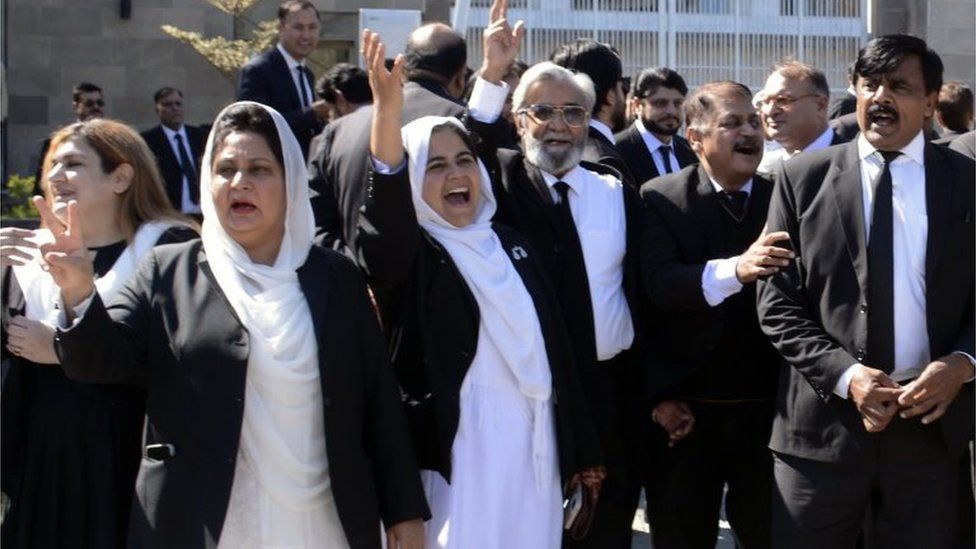
His path is clear to retake power if his party wins the most votes.
Not that they”re a shoo in- there’s a lot of resentment against Mr Sharif and his party, who are blamed for Pakistan’s economic misery. Mr Sharif is also heavily tarnished by his corruption accusations.
“They are going to win it but no party really ever comes in with an absolute majority, apart from Sharif once,” said Dr Farzana Shaikh, an associate fellow at Chatham House’s Asia-Pacific programme.
“Everything points to him coming in as prime minister, or head of the largest party,” she said, but added that it was uncertain what type of working majority he might have.
Will he get a fourth term as PM?
It is a turbulent, volatile time in Pakistan politics and Mr Sharif is presenting himself as the experienced leader with a track record of three premierships.
He’s promising to stabilise the economy and “right the ship” in Pakistan.
But analysts are still wary.
“Sharif’s supporters will hope his narrative of stability, experience, and dependability will get him votes- and also make the army comfortable with him, or at least comfortable with his party,” says Mr Kugelman.
He has a number of issues to navigate – not least an economy in crisis, for which his party is largely blamed, and widespread feelings the vote will not be fair because his main opponent is locked up.
“He is struggling because his party, led by his brother, was senior partner in the former coalition government, which had to implement a series of economic policies which have exacted a very high toll,” says Dr Shaikh. “Sharif and his party have been blamed for the economic misery if not the crisis that engulfs the country.”
And then there’s the military, which has a big say in how Pakistan is run.
While abroad, the ex-PM had been very vocal on occasion against the armed forces.
In particular he blamed an ex-head of the feared ISI intelligence agency and the former army chief of staff for political instability in the country, charges they denied.
He also strongly criticised the nation’s judiciary, accusing judges of collusion and saying he had been the victim of “bogus cases”. This, he said, had resulted in a crippled democracy that hadn’t let any of Pakistan’s prime ministers complete their constitutional tenure in office.
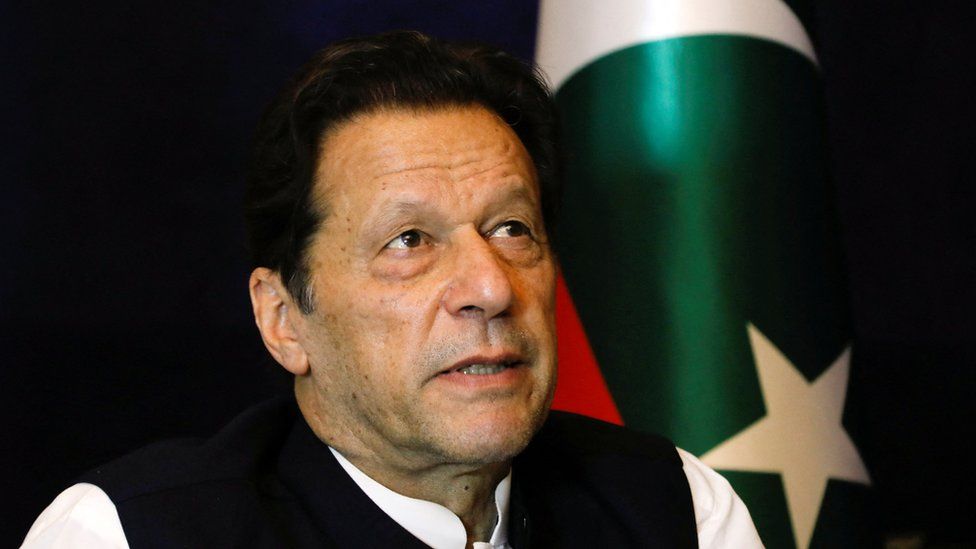
The military has never breathed a word on whether it prefers Mr Sharif or Mr Khan or any other political leader – stating on record that it does not get involved in politics.
But to analysts it would appear he has done a deal now with the military to facilitate his return.
“The fact that he’s received so much legal relief since returning home proves that he’s back in the good graces of a powerful military that exerts heavy influence over the judiciary,” says Mr Kugelman.
He notes the “great irony” of Sharif’s success; at the moment he’s riding high but he used to constantly spar with the military.
“[But] in Pakistan, when you’re a political leader and have the army behind you, your chances of electoral success tend to be higher.”
Related Topics
-
-
20 October 2023
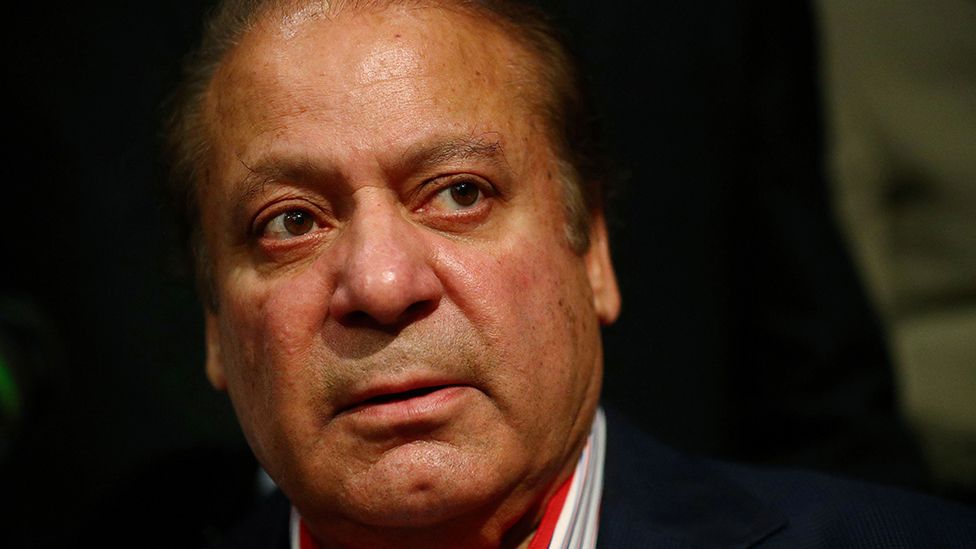
-
Very heavy traffic expected at Singapore-Malaysia land checkpoints during Chinese New Year long weekend
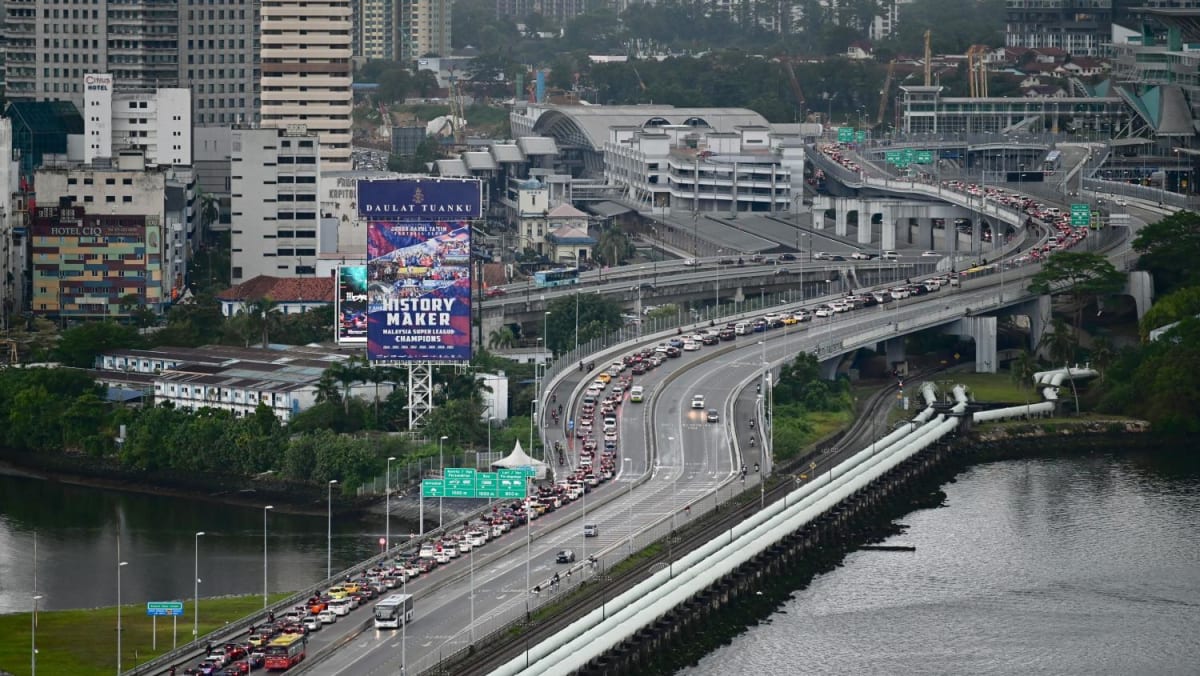
ICA warned travellers not to bring in prohibited items such as firecrackers, “Pop-Pop” weapons, electronic cigarettes and vaporisers.
They should also avoid bringing in controlled items like bak kwa and potted plants.
“Those bringing in dutiable or controlled items such as tobacco products items must proactively make declarations to our officers prior to being checked,” said ICA.
More details on the list of prohibited, controlled and dutiable items can be found on ICA’s website.
TRAVELLERS’ CHECKLIST
Drivers of Singapore-registered cars are reminded to observe the three-quarter tank rule, or risk being turned back at the checkpoints.
Vehicles must also have a valid Vehicle Entry Permit (VEP) as applications are no longer accepted at checkpoints to facilitate traffic flow.
“Drivers of foreign vehicles who are unable to present valid Autopass cards together with LTA’s VEP approval email and valid insurance will be turned back from Singapore,” said ICA.
Passports must have a remaining validity of at least six months. Singapore permanent residents who have renewed their passports will have to transfer their Re-Entry Permit to the new passport.
Long-term pass holders will need to notify ICA or the Ministry of Manpower of any change in their passport particulars before their entry into Singapore.
Before embarking on the journey, ICA’s advice is to first check the traffic situation at the land checkpoints.
This can be done through the Land Transport Authority’s One Motoring website or via the Expressway Monitoring & Advisory System installed along the Bukit Timah Expressway (BKE) and the Ayer Rajah Expressway (AYE).
ICA also warned drivers against queue cutting as it can cause severe congestion and compromise the safety of other motorists.
“Errant motorists caught queue cutting will be turned away and made to re-queue,” it added.
US approves $4bn sale of armed drones to India
 Reuters
ReutersThe US State Department has approved the potential sale of 31 armed drones, missiles and other equipment to India for nearly $4bn (£3.14bn).
The MQ-9B Predator drones deal had been announced during PM Narendra Modi’s visit to US in June 2023.
In December, it was put on hold by a Senate committee pending investigation into an alleged Indian assassination plot on US soil.
The deal will now be confirmed after approval from the US Congress.
It includes the sale of 31 armed MQ-9B SkyGuardian drones, 170 AGM-114R Hellfire missiles and 310 laser small diameter bombs, communications and surveillance equipment and a precision glide bomb, the Pentagon said. General Atomics Aeronautical Systems will be the principal contractor for the deal.
According to Reuters news agency, Senator Ben Cardin said he had ended his “hold” on the agreement for the deal after the US government agreed to fully investigate the assassination plot.
“The [Biden] administration has demanded that there be investigation and accountability in regards to the plot here in the United States, and that there is accountability within India against these types of activities,” Mr Cardin told reporters.
Last year, the US accused Delhi of plotting to assassinate an American citizen who advocates for Khalistan – an independent Sikh state carved out of India.
A government spokesperson said the US had “conveyed our expectations that anyone deemed responsible should be held accountable”.
India’s foreign ministry denied anything to do with the murder plot. It also said a high-level inquiry committee had been formed “to investigate the allegation and address the US government’s security concerns”.
On Thursday, the Pentagon said the proposed drone deal with India “will support the foreign policy and national security objectives of the United States by helping to strengthen the US-Indian strategic relationship”.

Read more India stories from the BBC:
Related Topics
Unleashing India’s human capital – Asia Times
India’s demographic landscape stands as a strategic advantage, characterized by a substantial working-age population (15-64 years old). Projections for 2030 envisage an impressive 1.04 billion individuals within this critical demographic, promising a favorable low dependency ratio.
This demographic dividend, however, is time-sensitive, necessitating swift and informed policy implementation to harness its potential fully.
India’s education ecosystem is central to unlocking this demographic dividend, with about one-fourth of the population falling within the age group actively engaged in educational pursuits.
To meet evolving skill requirements and foster innovation, the focus must shift from enrollment figures to the quality of education. A dynamic, globalized, and sustainable skill set, essential for navigating contemporary complexities, hinges on a foundation of high-quality education.
Interconnected goals
In this context, UN Sustainable Development Goal 4, which emphasizes quality education, emerges as a linchpin in advancing human capital in India. Acknowledged as a critical driver of economic advancement, SDG 4 significantly contributes to sustainable development and plays a crucial role in unlocking India’s economic potential.
By prioritizing human-capital development, SDG 4 aims to achieve universal education from preschool to secondary levels, ensuring a 100% gross enrollment ratio (GER) in schools.
The broader spectrum of Sustainable Development Goals 1-6 collectively forms a comprehensive strategy for enhancing human capital within the framework of sustainable development. These interconnected goals not only align with the broader SDG framework but also underscore the pivotal role of youth capital in India.
The involvement of young people in SDG processes is recognized at the highest levels, highlighting the importance of dynamic representation and inclusivity for successful SDG implementation.
| Human-Capital-Inducing SDGs | Key Youth-Impacting Indicators |
| SDG 1 (No Poverty) aims to “eradicate poverty in all its forms around the world.” Progress was dampened in 2019-21 by the Covid-19 pandemic. | There are a variety of youth-impacting indicators for the “no poverty” goal, such as “employed population living under the international poverty line, by sex and age”; “proportion of the population living below the national poverty line”; and “proportion of population living in households with access to basic services.” |
| SDG 2 (Zero Hunger), that is, “end hunger, achieve food security and improve nutrition and promote sustainable agriculture,” aims to ensure access by all people, particularly those who are poor and in vulnerable situations, including infants, to safe, nutritious, and sufficient food throughout the year. | Youth-centric indicators include “prevalence of moderate to severe food insecurity in the population”; “prevalence of stunting among children under the age of five”; and “prevalence of anemia in women aged 15 to 49 years, based on pregnancy.” |
| SDG 3 (Good Health and Well-being) aims to “ensure healthy lives and promote well-being for all at all ages.” | The indicators that affect the youth population include maternal mortality ratio; neonatal mortality rate; number of HIV-positive cases; and mortality rate attributed to cardiovascular diseases. |
| SDG 4 (Quality Education) aims to “ensure inclusive and equitable quality education and promote life-long learning opportunities for all.” | The available youth-related indicators measure proportion of children and young people that achieve a minimum proficiency in reading and mathematics, by sex, participation rate of youth and adults in formal and non-formal education and training in the past 12 months, completion rate by sex, location wealth quintile and education level in percentage. |
| SDG 5 (Gender Equality) aims to “achieve gender equality and empower all women and girls.” | The youth measures cover indicators such as proportion of ever-partnered women and girls above 15 subjected to physical, sexual or mental violence, proportion of women aged 20-24 years who were in a union before the age 15 or 18. |
| SDG 6 (Clean Water and Sanitation) intends to “ensure availability and sustainable management of water and sanitation for all.” | The indicators that affect the youth include proportion of domestic and industrial wastewater flows safely treated, change in water-use efficiency over time, and degree of integrated water resource management. |
Strategic priorities
Investing in SDGs, particularly in education and health, is paramount for harnessing the potential of India’s youth population. This strategic investment contributes to sustainable development by addressing economic, social, and environmental aspects, emphasizing the interconnectedness of these crucial elements.
Emphasizing the importance of skilling and quality education aligns seamlessly with the broader agenda of human-capital enhancement within the framework of sustainable development. Nurturing a workforce adept at navigating the ever-changing landscape of expertise is instrumental in ensuring long-term economic resilience.
For a developing nation like India, education emerges as a fundamental tool for creating the human capital necessary to sustain development in the 21st century. While significant progress has been made in enrolling children in schools, the focus must shift toward ensuring a quality education.
In times of scarce budget outlays for implementing the SDGs, optimizing financial resources toward educational infrastructure is of utmost importance. The quest for sustainable and inclusive development in India relies heavily on recognizing the transformative power of education and strategically directing resources to bolster the nation’s human capital.
S$400,000 confiscated from moneychanger who did not declare full sum of almost S$2m when entering Singapore
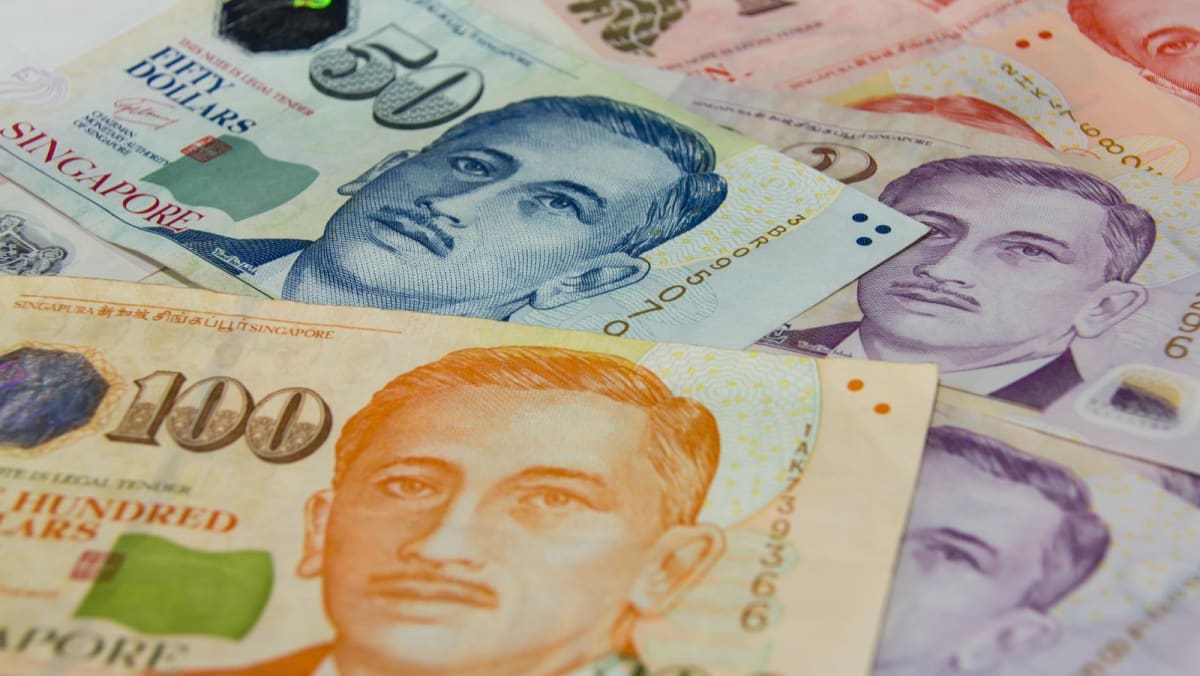
SINGAPORE: An employee of a Malaysian money-changing company tried to carry almost S$2 million into Singapore without fully declaring it.
Bryan Woo Kah Hou, a 26-year-old Malaysian, was fined S$30,000 (US$22,500) in November for his offences of conspiring to move cash into Singapore exceeding S$20,000.
On Thursday (Feb 1), a court ordered S$400,000 of the seized sum to be forfeited to the state. The remainder was returned to Woo.
According to a police news release on Friday, Woo had declared to an Immigration & Checkpoints Authority (ICA) officer on Jun 20, 2023 that he was carrying a sum of 468,000 Brunei dollars (US$351,000) and S$37,500.
Woo knew that this was not true and that he was carrying a much larger sum. He then submitted another form to the ICA officer, saying he was carrying a sum of S$135,000 and about 1.83 million Brunei dollars.
However, investigations revealed that this form was also inaccurate.
Woo was in fact carrying more than 1.95 million Brunei dollars and over S$25,000, a total value equivalent to S$1,979,053.
The cash was seized as part of investigations. Woo pleaded guilty in November to two counts under the Corruption, Drug Trafficking and Other Serious Crimes (Confiscation of Benefits) Act for moving cash into Singapore exceeding S$20,000 without accurately and fully reporting the amount.
A third charge was considered in sentencing.
This was Woo’s second time committing such an offence. In June 2023, he had submitted a false declaration on arrival in Singapore that he was carrying 428,000 Brunei dollars and S$30,000, when he was actually carrying about S$1 million.
The prosecution applied for a confiscation order on Thursday, asking for S$400,000 to be confiscated from the seized cash.
The court granted this application.
In a statement, Commercial Affairs Department director David Chew said the cross-border cash reporting regime is one of Singapore’s measures to curb money-laundering, terrorist financing and other criminal activities.
“All travellers should do their part, including money service businesses be it regulated in Singapore or elsewhere, by making full and accurate cash movement declarations,” said Mr Chew.
He said all travellers who are arriving in or departing from Singapore must make a report of the physical movement in and out of Singapore of any currency exceeding S$20,000, or its equivalent foreign currency.
The report must contain full and accurate information, and failure to do so is an offence drawing penalties of a maximum three years’ jail, a maximum fine of S$50,000, or both.
ICJ on Gaza: the consequences of non-compliance – Asia Times
Five days after the International Court of Justice (ICJ) announced interim measures aimed at preventing the State of Israel from committing acts in Gaza that come within the scope of the Genocide Convention, the butchery of the largely unarmed and impoverished inhabitants of the small strip of land continues unabated.
The Convention prohibits such things as “killing members of the [targeted] group, deliberately inflicting on the group conditions of life calculated to bring about its physical destruction in whole or in part, and imposing measures intended to prevent births within the group.”
In the first two days after the January 26 ICJ order was issued, for instance, 373 Palestinians were killed in Gaza, the majority of them children and women.
We should not be surprised that Israel has defied the ICJ. It has defied it before, demonstrating contempt for international law. It sees itself as above the law. It has always acted as though the restraints and limits that law imposes on states and individuals do not apply to it. Israel is special. It can do what it wants.
The main reason for this is the Nazi Holocaust before and during the Second World War. As one of the principal victims of that terrible tragedy, many Jews have come to believe that the suffering they have had to bear somehow absolves them from any wrongdoing. After all, the Genocide Convention itself was a consequence of the Holocaust.
How could anyone now accuse the Jewish state of Israel of genocide? That the victims of a gross, wanton injustice sometimes become the most heinous perpetrators of inhuman crimes against fellow human beings once they gain power is a glaring truth that many Israelis have chosen to ignore.
If the Israeli elite is so determined to wipe out the Gazan population and tighten its suffocating grip over Gaza, it is because it is part of its ethnic-cleansing agenda that began in 1948 with the expulsion of more than three-quarters of a million Palestinians from their homes to pave the way for the creation of the state of Israel.
Ethnic cleansing of Palestine, it must never be forgotten, is a primary goal of Israel that has now reached a new phase with the current assault on Gaza.
Economic motives
What renders added significance to the current assault are the underlying economic and geopolitical motives behind the move. It is reported that a trillion cubic feet of gas discovered off the Gaza shoreline in the 1990s could bring massive wealth to Israel if it can eliminate the real owner of Gaza, namely Palestine.
It would enable Israel to supply gas to Europe, replacing Russia. Israel would also become a major player in the formulation of oil and gas policies and the ensuing politics in the region and beyond. This may be one of the reasons the US and, to a great extent, Europe are prepared to provide cover to Israel’s drive to control Gaza.
Gas wealth and its geopolitical promise must be read in conjunction with another plan associated with Israel and the US. Those two countries, it is alleged, are set to build a new canal, the Ben Gurion Canal, from the northern tip of Gaza that will open a new naval route to the Mediterranean and beyond.
It would not only reduce dependence on the Suez Canal but also create a new route for global trade with the East and the West. For the US in particular, the Ben Gurion Canal may well emerge as its much-needed buttress helping to perpetuate its power as a global hegemon.
This is why Gaza is so critical – for the aggressor that is hell-bent on annexing the strip, and for the victim that realizes the survival of its inhabitants as part of Palestine is fundamental to that nation which is now under Israeli occupation.
The steadfastness of the Palestinian people, their willingness to sacrifice their lives for freedom and dignity, will undoubtedly be a major factor in ensuring that Gaza survives.
The massive support for the people of Gaza expressed by millions around the globe – the millions who are demanding both an immediate, unconditional ceasefire and the free flow of humanitarian assistance to the beleaguered citizens of the strip – will also help to reinforce their cause.
The ICJ directives of January 26 could also have a salutary effect.
Since Israel is required to submit a report to the ICJ within one month of the announcement of the directives, the Court can do a thorough assessment of whether Israel has complied. If Israel is guilty of non-compliance, the ICJ can request that the UN General Assembly suspend Israel’s membership.
If suspension does not bring about a positive change in the behavior of the State of Israel, the UNGA can after a reasonable period of time move on to the second stage.
It should then direct all member states to boycott Israel in every sphere of activity – from politics and economics to culture and sports. The boycott will last as long as Israel continues to kill people in Gaza or the West Bank or acts in any manner that contributes toward genocide as spelled out under the Genocide Convention.
A firm resolve on the part of the majority of UN members to act decisively against Israeli arrogance will surely produce the desired result.
Chef Teppei Yamashita’s new restaurant in Wisma Atria takes over Koh Grill & Sushi Bar space
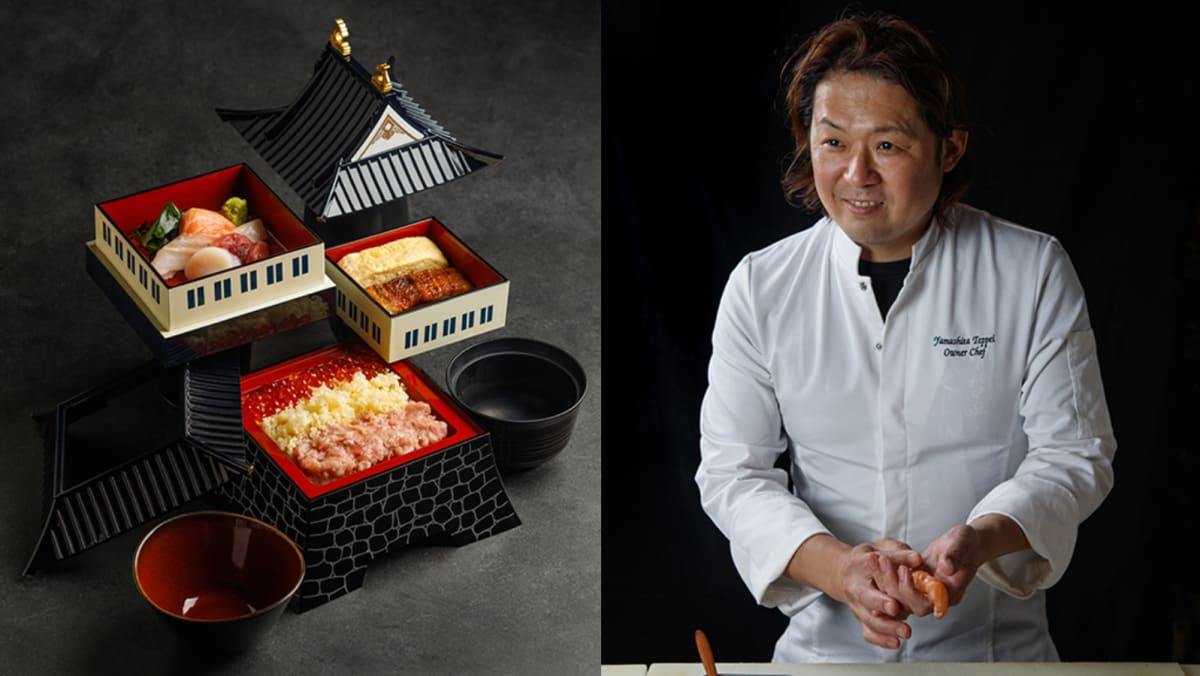
As it turns out, a new standalone Japanese diner is indeed opening its doors at the same spot this February. It’s owned by Japanese sushi chef by training Teppei Yamashita, who also runs popular eateries like Unagi Tei (formerly known as Man Man Japanese Unagi) and eponymous wallet-friendly omakase restaurant Teppei in Tanjong Pagar.
The upcoming Wisma Atria restaurant is his first concept located in a food court. Called Kai Kai Sushi & Grill, it is named after the Singaporean slang term gai gai, which means ‘to go out’.
AFFORDABLE PRICES
It will also have a teppanyaki counter layout similar to its predecessor, and offer “restaurant-quality food at affordable prices in a casual dining izakaya-style setting”. Kai Kai’s seafood and ingredients, like abalone, squid and cod, are “imported directly from Japan”.
WAGYU BEEF SUKIYAKI
Deaf community welcomes study on an official sign language in Singapore, but educational challenges remain
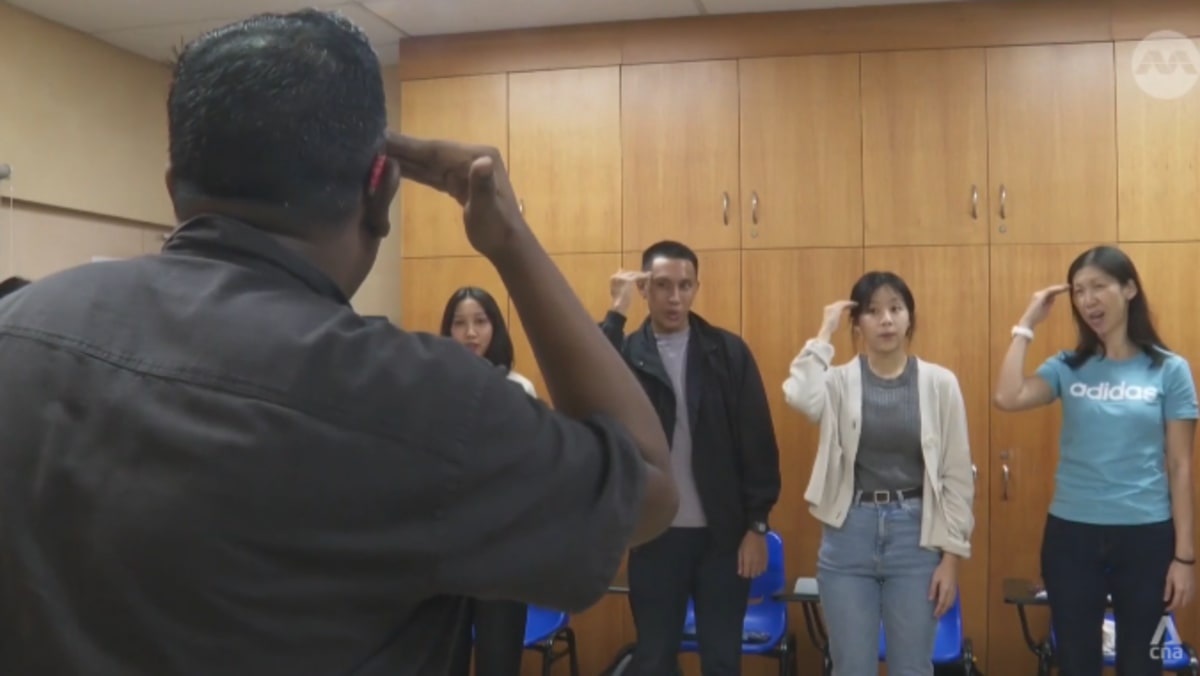
“With the official recognition of SgSL – in the sense that it’s recognised as a real language, an officially accepted language by the government, by authorities, and by society at large – then it will be easier for us to push for more accessibility and accommodation,” said Mr Alvan Yap, deputy director of the Singapore Association for the Deaf (SADeaf).
He added these include advocating for sign language interpretation in the media, and in daily life settings such as in classrooms, at hospitals and workplaces.
CHALLENGES IN SCHOOLS REMAIN
However, some educators cautioned that SgSL cannot replace SEE, which mirrors English vocabulary and grammar.
Students with hearing loss need to know SEE for national examinations in English, such as the O-Level examinations, they said.
“SgSL expresses in a more visual, manual mode of language. To teach English to students you use the SEE tool – a signing system that visually represents every English word,” explained Ms Goh.
She added that both should be taught simultaneously.
SIGN LANGUAGES IN SCHOOLS
In response to CNA’s queries about how SgSL might be rolled out, the Education Ministry’s (MOE) message is that there is no one size that fits all.
For students who require signing support in schools, SgSL is the language for school programmes and daily communication.
To support students in accessing the national curriculum, the ministry has two mainstream schools – Mayflower Primary School and Beatty Secondary School – designated with resources and SgSL-trained staff.
Specialised teachers and interpreters also can tailor their teaching methods to suit students’ needs, which include using SEE to teach English.
Students may also be provided with access arrangements for national examinations, such as exemption from the listening comprehension component, or the use of a sign language interpreter.
North Korea’s Kim Jong Un inspects shipyard building warships: Report
North Korean leader Kim Jong Un inspected a shipyard and underscored the importance of a strong naval force in “war preparations”, state media Korean Central News Agency (KCNA ) said on Friday (Feb 2). Kim’s visit is being made public after North Korea tested its new submarine-launched cruise missiles on Sunday,Continue Reading

